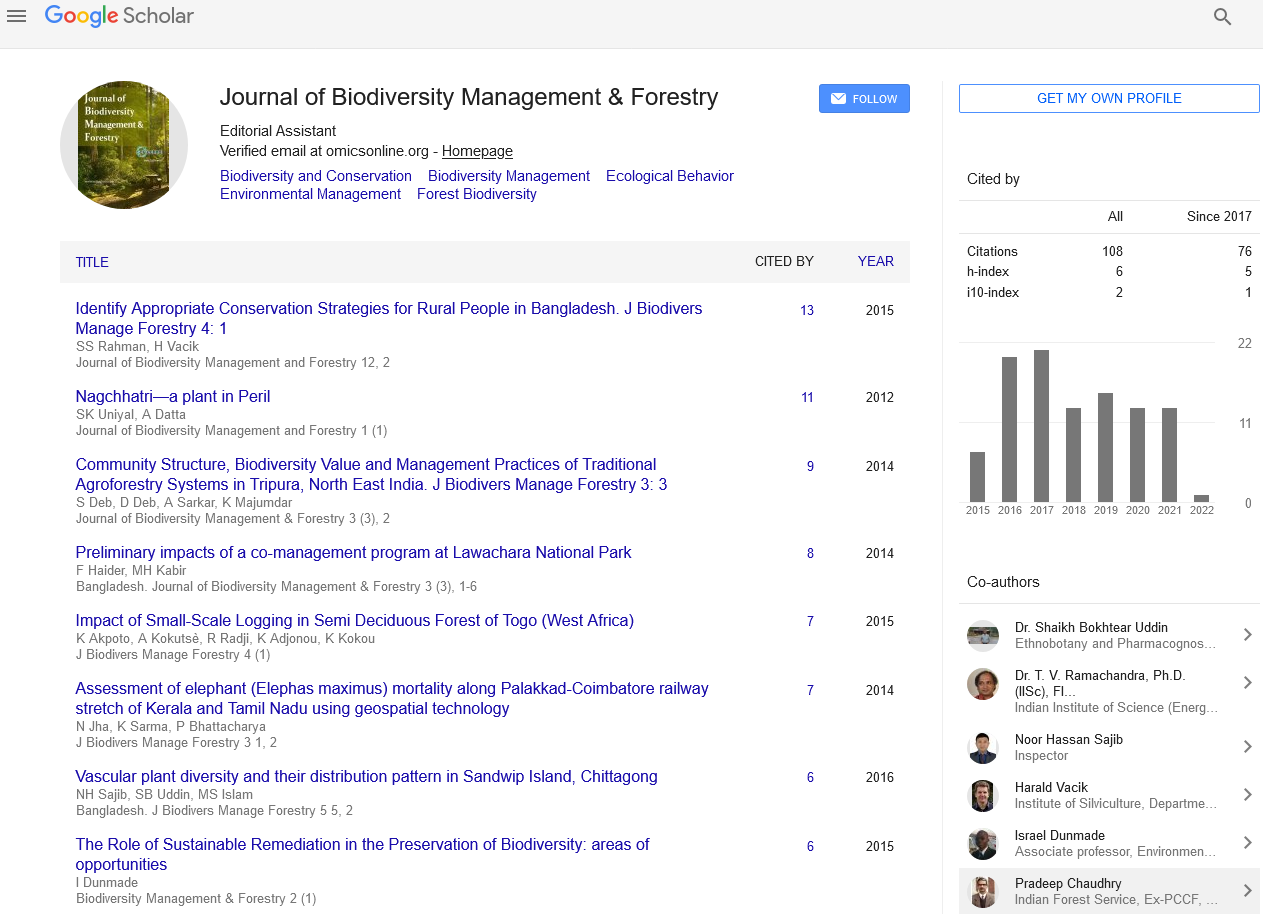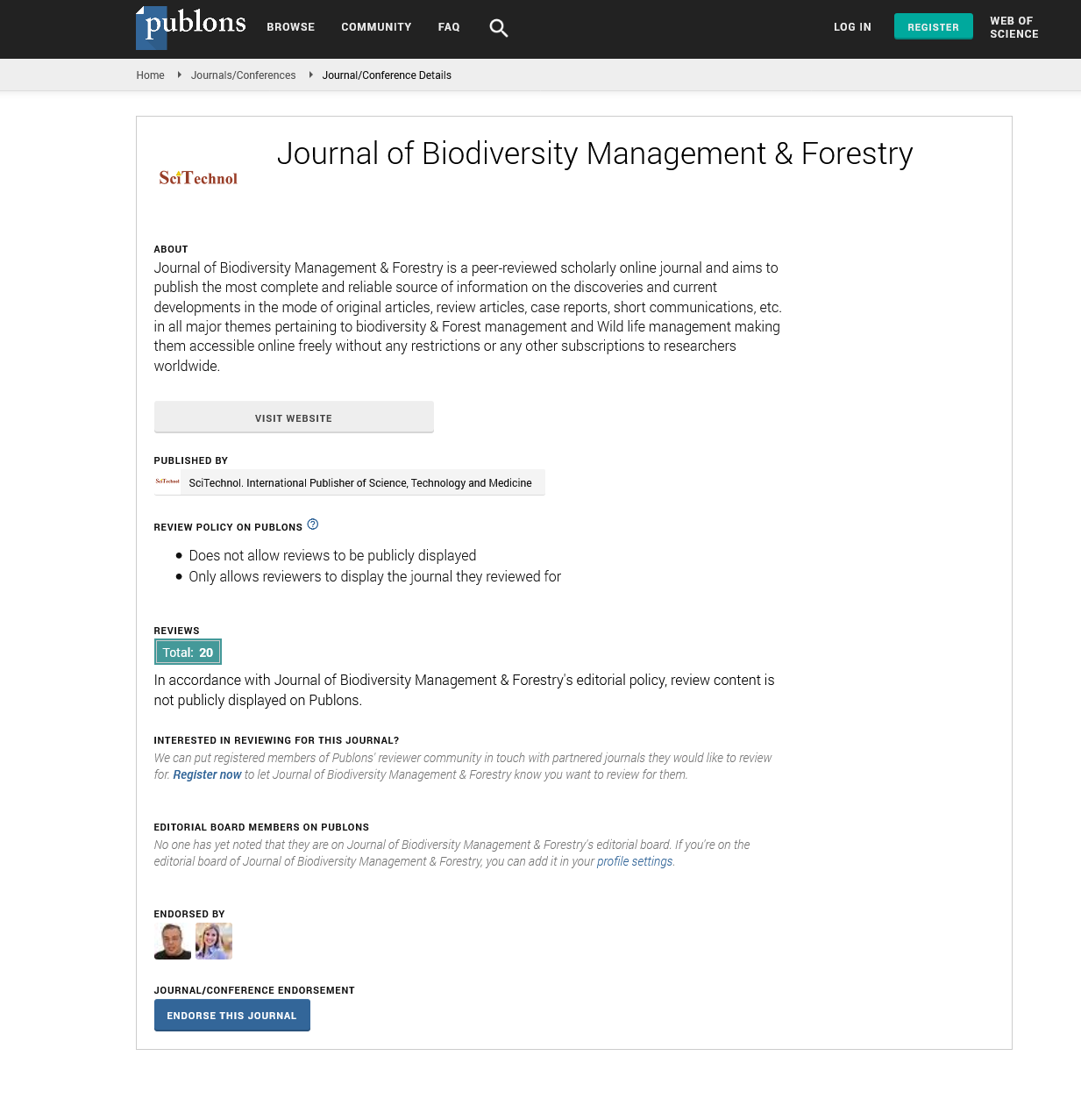Opinion Article, J Biodivers Manage Forestry Vol: 12 Issue: 1
Assessing the Impacts of Human Activities on Biodiversity in Forest Ecosystems
Brian J Ralph*
1Department of Biodiversity, Cornell University Ithaca, New York, United States of America
*Corresponding Author: Brian J Ralph
Department of Biodiversity, Cornell
University Ithaca, New York, United States of America;
E-mail: ralphj@bri.an.edu
Received date: 02 February, 2023, Manuscript No. JBMF-23-92304;
Editor assigned date: 06 February, 2023, Pre QC No. JBMF-23-92304 (PQ);
Reviewed date: 13 February, 2023, QC No. JBMF-23-92304;
Revised date: 20 February, 2023, Manuscript No. JBMF-23-92304 (R);
Published date: 27 February, 2023, DOI:10.4172/jbmf 2327-4417.10022
Citation: Ralph BJ (2023) Assessing the Impacts of Human Activities on Biodiversity in Forest Ecosystems. J Biodivers Manage Forestry 12:1.
Description
Human activities can have significant impacts on biodiversity in forest ecosystems. Here are some of the ways human activities can affect biodiversity.
Deforestation
Deforestation, or the permanent removal of forest cover, is one of the most significant threats to forest biodiversity. Clearing forests for agriculture, livestock grazing, and timber harvesting can reduce the amount of habitat available for forest-dwelling species, and can even lead to the extinction of some species.
Fragmentation
Human activities such as road construction and urbanization can fragment forest ecosystems, isolating populations of species from each other and reducing genetic diversity. This can make it difficult for species to move between habitats and can lead to a loss of biodiversity over time.
Hunting and poaching
Hunting and poaching can have a significant impact on forest biodiversity, particularly for large mammals and birds. Overhunting can cause declines in populations, which can lead to a loss of genetic diversity and an increased risk of extinction.
Climate change
Climate change can affect forest ecosystems in many ways, from altering temperature and precipitation patterns to causing shifts in the timing of seasonal events. These changes can affect the timing of plant growth and reproduction, as well as the migration patterns of animals. In some cases, these changes can make it difficult for species to adapt and survive.
Pollution
Pollution from human activities can also have negative impacts on forest biodiversity. For example, acid rain can damage soil and water resources, affecting the health of plants and animals. Pesticides and other chemicals can also have direct impacts on wildlife, either through direct poisoning or by disrupting food webs. Overall, human activities can have significant impacts on forest biodiversity, and it is important to take steps to mitigate these impacts in order to ensure the long-term health and survival of forest ecosystems and the species that depend on them.
Human activities on biodiversity in forest ecosystems
Forests are one of the most important ecosystems on our planet, providing essential benefits such as oxygen production, carbon storage, and habitat for countless species. However, human activities have had a profound impact on biodiversity in forest ecosystems, causing widespread loss of species and ecosystems. In this article, we will explore some of the most significant ways in which human activities have affected biodiversity in forest ecosystems. One of the most damaging human activities in forest ecosystems is deforestation. Deforestation is the process of clearing large areas of forest for human use, such as agriculture, urbanization, and logging. Deforestation destroys the habitat of countless species, leading to biodiversity loss, and also contributes to climate change by releasing carbon into the atmosphere. It is estimated that deforestation accounts for up to 10%of global greenhouse gas emissions.
Another significant human activity that impacts biodiversity in forest ecosystems is hunting and poaching. Many forest species, such as primates and large mammals, are hunted for their meat, skins, or other body parts. This can lead to local extinction of the species, disrupting food webs and other ecological processes. Forest fragmentation is also a major human impact on biodiversity in forest ecosystems. Fragmentation occurs when large areas of contiguous forest are broken up into smaller patches by human activity, such as agriculture or urbanization. This can lead to habitat loss, decreased genetic diversity, and reduced connectivity between forest fragments, making it harder for species to migrate and maintain healthy populations. Climate change is another significant human activity that impacts biodiversity in forest ecosystems. Rising temperatures, changes in rainfall patterns, and other climatic factors can affect the growth and survival of forest species, leading to shifts in species ranges, altered phenology, and other ecological impacts. As a result, forest ecosystems are becoming increasingly vulnerable to the effects of climate change, and many species are at risk of extinction.
In addition to these direct impacts, human activities can also have indirect effects on biodiversity in forest ecosystems. For example, pollution from industry and agriculture can contaminate forest soils and waterways, leading to reduced soil fertility, decreased water quality, and other environmental impacts that can affect the health and survival of forest species.
Human activities have had a profound impact on biodiversity in forest biodiversity in forest ecosystems, with deforestation, hunting, forest fragmentation, climate change, and pollution being some of the most significant drivers of biodiversity loss. It is essential that we take action to address these impacts and protect the biodiversity of forest ecosystems for the benefit of both humans and the planet as a whole.
 Spanish
Spanish  Chinese
Chinese  Russian
Russian  German
German  French
French  Japanese
Japanese  Portuguese
Portuguese  Hindi
Hindi 
